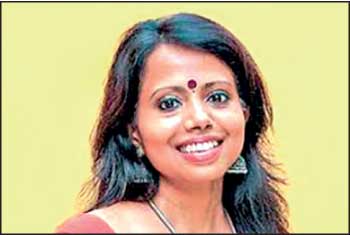Monday Feb 16, 2026
Monday Feb 16, 2026
Saturday, 4 October 2025 01:08 - - {{hitsCtrl.values.hits}}
 |
| Ambika Satkunanathan |
Human rights advocate Ambika Satkunanathan has cautioned that when economic growth and financial tools do not automatically solve gender inequality, it could reproduce existing disparities.
“When we speak of solutions – economic growth, wealth creation and technology are touted as solutions to gender inequality, but they will not automatically provide solutions unless we address the existing inequalities which will be reproduced in different ways,” she said.
Delivering the keynote speech at the forum ‘Amplifying the Voices of Women’ organised by the South Asian Women in Media (SAWM) held on 1 October,
Satkunanathan, the former Human Rights Commissioner of Sri Lanka, said women, who were targeted, had limited financial literacy and lived below the poverty line as they had little education or marketable skills, and had also lost their assets due to the war but they needed finances for their children.
She described how in the post-war, banks and finance companies opened in the war-affected North and East, specifically targeted women-headed households for loans and micro-credit.
“These women had mortgaged their few remaining assets to start income-generating activities. However, these ventures were often not profitable because they didn’t cater to market needs or gaps, and the women were not connected to marketing networks,” she said.
She explained that when women were unable to repay the loans, they faced severe harassment from loan recovery officers and the situation became so dire that it even led to some women committing suicide.
Satkunanathan presented this as evidence that simply introducing financial systems into a region without addressing the underlying structural and systemic inequalities and discrimination will not lead to positive outcomes for vulnerable women.
Meanwhile, she has also cautioned that the progress on gender equality was being actively reversed and women were being systematically erased from public life through a combination of overt legal restrictions and insidious covert tactics.
She explained how covertly, tools such as social media were being used to perpetrate violence against women and influence women to reject public life, a career and aspirations that extend beyond the home and domestic duties.
“One prominent example is the “Trad wife” phenomenon, a social media trend that glamorises domestic labour to influence young women to reject careers and financial independence. This trend stands in sharp contrast to the economic reality faced by women globally,” she said.
Satkunanathan cited International Labour Organization’s findings in 2023, which stated that 748 million people were not participating in the global labour force because of care responsibilities, of which 708 million were women and 40 million were men.
“The ILO stated that this stark gender discrepancy highlights the disproportionate role that women take on in child-rearing, care, and support for persons with disabilities and those in need of long-term care, housekeeping, and other care responsibilities,” she noted.
Satkunanathan also highlighted the transforming nature of violence against women, which has found new and disturbing forms in the digital age where she referred to a chilling example of a YouTube channel which carried AI generated videos of women being shot.
Before being taken down, the channel had nearly 200,000 views in just three months, revealing a shocking liking to view for such violent content.
Satkunanathan stressed that extreme acts of violence, particularly sexual violence, do not exist in a vacuum but are part of a continuum of everyday violence that society has normalised.
“In this new world, women will not fall into the trap of defining their needs within patriarchal value systems. They will not view the need for emotional care as weak. They will accept they are not superhuman or invincible but are very much human. Women will know that we too need support, and needing or asking for it is not weak. Strength lies in seeking help when needed and solidarity,” she stressed.